Key points
- The centre-left Social Democrats emerged as the largest party on election night, with the CDU/CSU nipping at their heels in second place
- At the final count, Olaf Scholz's took 25.7 percent of the vote, followed closely by Merkel's Christian Democrats and their candidate Armin Laschet on 24.1 percent
- It's the CDU's worst post-war result
- Candidates for each of the two biggest parties say they are keen to form a governing coalition 'by Christmas'. They both say they have a mandate to govern
- Other results show the Greens on around 14.8 percent, the Free Democrats (FDP) with about 11.5, percent, Alternative for Germany (AfD) with 10.3 percent
- Die Linke (the Left) narrowly missed the 5 percent threshold to enter parliament, but managed to secure the three direct mandates it needs to enter nonetheless
- Read all our recent election coverage HERE.
We're packing it in for the night after an exciting election day and night. We hope you've enjoyed our coverage. What have we learned so far? Well... Germany won't know its government and new chancellor for some time yet. The centre-left SPD have emerged as the largest party on 25.7 percent of the vote share to the CDU/CSU's 24.1 percent - but both parties say they have a mandate to form a government. Get set for lots of coalition talks. We'll be back in the morning with more news and analysis.
READ MORE: Scrum for German chancellory as SPD takes lead in post-Merkel election
ZDF-Hochrechnung zur Bundestagswahl.
— ZDF (@ZDF) September 26, 2021
(Stand 23:34 Uhr)#btw21 pic.twitter.com/uSmuSMPQKe
11.31pm - CDU loses Merkel's voting district
In a sign of how bad this election is for the Christian Democratic Union (CDU), Angela Merkel's district in Mecklenburg-Western Pomerania is looking like it will fall into the hands of the SPD.
#Merkel’s voting district is won by SPD https://t.co/TLdTylY1my
— Patrick Donahue (@patrickjdo) September 26, 2021
11:15pm - SPD still ahead in the race (just)
Centre-left Social Democrats still in the lead, according to the latest preliminary results.
Die neuste Hochrechnung zur Bundestagswahl. Die SPD kommt auf 26 Prozent - die Union liegt knapp dahinter bei 24,5 Prozent. #btw21 pic.twitter.com/HVSPYJuFbF
— ZDFheute (@ZDFheute) September 26, 2021
10:50pm - SPD on course for victory in Mecklenburg Western-Pomerania
In the state elections in Mecklenburg Western-Pomerania, the SPD are on track to emerge as the largest party by some distance.
According to the initial projections from broadcaster ZDF earlier this evening, the centre-left SPD had achieved around 38 percent of the vote, while the far-right AfD were the second largest party, with around 18 percent of the vote. The CDU were trailing in third place on 14 percent - around five points below their 2017 result.
Merkel's former constituency in Mecklenburg-Vorpommern goes SPD. Her successor as CDU chair Annegret Kremp-Karrenbauer likely to lose her constituency in the Saarland to the SPD. Huge collapse for the Union tonight - which polled 42% 8 years ago #btw21
— William Bain (@William_Bain) September 26, 2021
10.42pm - Tight race to win Berlin’s state parliament
According to the latest projections, the battle to become the largest party in Berlin’s state elections is still nail-bitingly close. The SPD are one point ahead of the Greens, with 22.4 percent to 21.4 percent, while the CDU are on track to be the third largest party with 16.9 percent of the vote. The Left Party, meanwhile, is currently at 13.9 percent.
10:41pm - Initial results show win for Berlin referendum to expropriate the city's biggest landlords
Preliminary results have been released on Berlin's referendum - and they show that 56.9 percent of people have voted yes to expropriating rental homes to the state from the city's large private landlords, such as Deutsche Wohnen and Vonovia.
However, keep in mind that final results will be released on Monday.
❗️Das hier ist nur eine Hochrechnung, das finale Ergebnis bekommen wir erst morgen❗️
— Deutsche Wohnen & Co Enteignen (@dwenteignen) September 26, 2021
💜✊ Aber schon diese Zahl zeigt, das die Berliner:innen genug haben von Spekulation und Mietenwahnsinn. #dwenteignen pic.twitter.com/f0sMehiGim
10:30pm - Do we know anything more about possible coalitions?
As Süddeutsche Zeitung’s Oliver Klasen makes clear, there’s a strong message coming through from the SPD and the CDU/CSU tonight: both of them still want to lead a coalition after the vote.
So who could they work with? Well, if the SPD and CDU/CSU don’t team up in yet another Grand Coalition (and that’s a pretty big ‘if’), there are two other possible options: a ‘traffic light’ with the SPD, FDP and Greens, or a ‘Jamaica’ with the CDU/CSU, FDP and Greens.
FDP leader Christian Lindner and Greens chancellor candidate Annalena Baerbock made clear during the ‘elephant’s round’ post-election discussion that they could well be willing to work together in some way or another within a future coalition.
But with which of the larger parties? “Christian Lindner wants to talk to the Greens first, but avoids clear signals in the direction of a traffic light,” Oliver Klasen writes.
"Annalena Baerbock is open to talks with the Liberals. Scholz seems very confident throughout the evening that he will emerge victorious from the negotiations, while CSU leader Markus Söder looks sour all evening, but says: ‘All parties have to get out of their comfort zone. Which probably means the Greens in particular." One thing we know: the upcoming coalition negotiations are set to be tense.
10:15pm - AfD comes first in two eastern states
Based on the current stand of things, the AfD has lost around 2 percentage points nationally—but for the first time, came in first in both its strongholds in eastern Germany, Saxony (by a large margin) and Thuringia (by a narrow one) #btw21 pic.twitter.com/I6rqomGsFz
— Emily Schultheis (@emilyrs) September 26, 2021
10:03pm - Who are the winners and losers of this election?
Although we don’t know the final results yet, we have an idea of who's going to be celebrating - and who will be drowning their sorrows. Here's some analysis from The Local's Rachel Loxton -
THE LOSERS:
CDU/CSU - Angela Merkel’s Christian Democratic Union (CDU) and its Bavarian sister party the CSU have suffered historic losses - possibly losing more than 8 percent compared to the 2017 result when they managed to scoop 32.9 percent. Even if they edge ahead in the polls, this is clearly still a very bad election for them. Before the conservatives take stock, they'll likely be pushing to try and form a coalition government.
Die Linke - the Left party - are also suffering badly in this election. So badly in fact that it's not even clear if they will reach the 5 percent hurdle to make it into the Bundestag. At the moment it looks like their share of the vote has dropped by around 4.2 percent compared to 2017.
Alternative for Germany (AfD) - the far-right party appear to be in line for around 10 percent of the vote. That would mean a loss of around 2.6 percent compared to 2017. Not a huge drop but clear that some people are moving to other parties.
THE WINNERS
SPD - The centre-left Social Democrats look to be up almost 5 percent from the 2017 result. And you can probably tell from the happy pictures of SPD supporters and chancellor candidate Olaf Scholz that they are popping the champagne bottles. Overall, though, it's clear that the decline in the so-called people's parties is continuing. The smaller parties are gaining more support, and the picture is more fragmented: queue even more complicated coalition building.
The Greens - The Greens are up around 5.4 percent compared to the 2017 result. Although that's technically a very big jump, the Greens were hoping to do better - they'd even topped the polls in spring. However, this is likely to be a solid result for die Grünen.
THE HOLD-STEADYS
FDP - The Free Democrats seem to have received a similar result to 2017, with a slight increase of about 0.8 percent.
9pm: ARD and ZDF projections are converging, both see SPD clearly winning most votes (around 26%) and most seats (204-210) pic.twitter.com/X5JAwSfqrQ
— Mathieu von Rohr (@mathieuvonrohr) September 26, 2021
9:53pm - Social Democrats widen lead in latest results projections
The Social Democrats have widened their lead according to preliminary polls.
Here are broadcaster ZDF’s latest projections:
SPD: 26.0 percent
CDU/CSU: 24.5 percent
Greens: 13.9 percent
FDP: 11.7 percent
AfD: 10.5 percent
Left: 5.0 percent
Wow, SPD extending its lead in latest ZDF estimate. Now 1.5 percentage points ahead of CDU/CSU pic.twitter.com/Wsd3Jjqhgq
— Olaf Storbeck (@OlafStorbeck) September 26, 2021
9:50pm - What would life be like under a CDU/CSU-led coalition - or an SPD-led one?
Coalition talks will get underway as soon as the final election results are in. Right now, it's a close battle between the SPD and the CDU/CSU to win the most votes and become the largest party in parliament. After that, each of them will race to form a government by going into a coalition with at least one other party.
Wondering what your life would be like under a CDU-led, or an SPD-led, coalition?
Then check out our recent articles:
- Election 2021: What an SPD-led coalition could mean for foreigners in Germany
- Election 2021: What a CDU-led coalition could mean for foreigners in Germany
9:42pm - Scholz set to beat Baerbock in Potsdam
Two of the leading candidates in the race to replace Merkel – Annalena Baerbock of the Greens and Olaf Scholz of the centre-left Social Democrats (SPD) – are running in constituency 61, which includes Potsdam.
With 90 percent of the vote counted in the constituency, Scholz looks set to comfortably beat Baerbock in the battle to secure the highest number of first votes and a direct mandate.
READ ALSO: ‘Potsdam is a mirror of Germany’: Chancellor candidates go head to head in local battle
At the latest vote count, the SPD’s Scholz had gained an insurmountable lead over his Green rival, with 34 percent of first votes to Baerbock’s 19 percent.
Due to Germany’s proportional voting system, Baerbock can still enter parliament if she doesn’t win in Potsdam. The percentage of second votes a party gets determines the number of seats they get in parliament. While people who win on first votes are guaranteed a seat in the Bundestag, parties also draw up lists of their preferred candidates to fill the additional seats they win. As co-leader, Baerbock should be at the top of this list.
According to the latest projections, the Greens could secure 13.9 percent of the vote, while the SPD could get 26 percent. The CDU/CSU are currently trailing slightly behind on 24.5 percent.
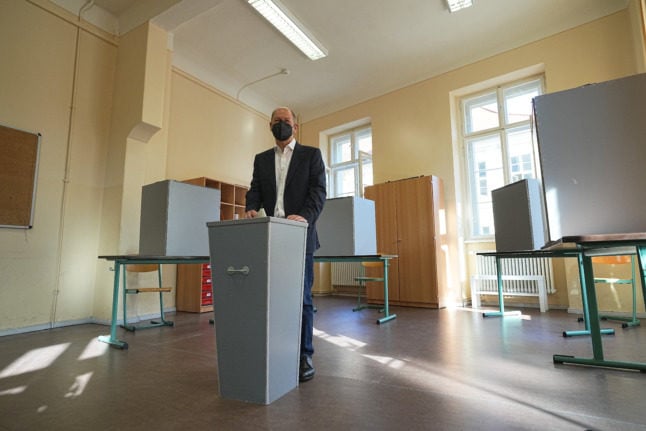
Olaf Scholz (SPD) voting in Potsdam, near Berlin, on Sunday. Photo: picture alliance/dpa/dpa Pool | Michael Kappeler
9:21pm - Germany's Scholz and Laschet hope to have a coalition 'by Christmas'
During the post-election talks in Berlin, the candidates were asked about how long it will take to build a coalition.
When the SPD's Olaf Scholz was asked if he thought outgoing chancellor Angela Merkel would have to give this year's New Year address he said he hopes that won't be the case.
SPD's Olaf Scholz asked if outgoing Merkel will give Germany's annual New Year address. Scholz says: "I hope we’ll get there faster so Mrs Merkel won’t have to give the New Year’s speech again. We must do everything we can to make sure we finish by Christmas or well before.”
— Rachel Loxton (@RachLoxton) September 26, 2021
On the same programme, his rival Armin Laschet from Merkel's Christian Democrats said he also had that target: "Yes, definitely before Christmas."
9:15pm - It's 'not game over for conservatives'
Hamburg-based political scientist Marcel Dirsus has been analysing results and says no-one should discount the centre-right CDU/CSU just yet. Again he emphasises that the coalition talks will be complicated and lots of different outcomes are possible.
"The election campaign was bad but coalition negotiations are going to be fun," he said. "I don't mean that sarcastically, I genuinely think it will be really interesting."
https://twitter.com/marceldirsus/status/1442195783462252553?s=20
9:10pm - Left Party claims 'the biggest losers are the people'
In the so-called 'Elephant's Round', the Left Party representative, chairwoman Susanne Hennig-Wellsow, has been avoiding questions on her party's catastrophic performance.
The real losers of the evening are the people who have to live in poverty in this country, she says, adding that the German population could now face a "centrist coalition" that will not ask important social questions.
In the latest projections, the Left are on five percent of the vote share. This means, if they underperform just slightly, they could struggle to enter the federal parliament. Even if they do, a coalition between the Left, SPD and Greens - the so-called 'red-red-green' coalition - is no longer likely to be able to secure a majority.
https://twitter.com/Martialis1/status/1442166543782133761?s=20
8:56pm - Berlin housing referendum awaits provisional results
The campaign to seize thousands of rental properties from Berlin's largest landlords is awaiting the projected results of the referendum.
Tweeting from its election party base in Berlin, the Expropriate Deutsche Wohnen & Co. campaign said: "We're waiting with excitement for the results. But we're looking forward to the first projections."
The official outcome of the referendum is expected to be announced on Monday.
https://twitter.com/dwenteignen/status/1442199568532353027?s=20
8:47pm - Outcome of election - and potential coalitions - still unclear
Here are the latest provisional results from German broadcaster ZDF:
CDU/CSU: 24.5 percent
SPD: 25.9 percent
Greens: 14.1 percent
FDP: 11.7 percent
AfD: 10.6 percent
Left: 5 percent
Other parties: 8.2 percent
If the results stay the same throughout the night, a Grand Coalition between the SPD and CSU/CDU would be possible, as well as a 'traffic light' coalition between the SPD, Greens and FDP, or a 'Jamaica' coalition with the CDU, Greens and FDP.
It's worth pointing out here that, even if the CDU/CSU end up in second place, they could still form a coalition (with or without the SPD) after the election. The same goes if the SPD come out in second place - they can still potentially govern. What matters most is whether parties can find enough ground with other political parties to form a coalition that can secure a majority.
https://twitter.com/derJamesJackson/status/1442188404133793792?s=20
8:37pm - SPD's Olaf Scholz 'almost emotional'
In the SPD's election night party at Willy Brandt House in Berlin, supporters of the party are in a jubilant mood, having taken a narrow lead over the CDU in the first wave of results.
When Olaf Scholz appeared to give his speech earlier tonight, the notoriously dry Finance Minister was "dangerously close to showing some emotion," one commentator said.
https://twitter.com/Ruairi_Casey/status/1442175063747219461?s=20
8:30pm - CDU/CSU decline down to loss of ‘competence’
According to the exit polls, the CDU/CSU have lost twice as much support among women as they have among men in this election - a sign that the Merkel effect has well and truly worn off.
But polls also suggest that the public’s sense of the conservatives’ competence has also taken a beating.
“The losses in competence are dramatic,” wrote WDR’s Jörn Schönenborn in his post-election analysis. “Economic competence alone has dropped by 25 points. In addition, there are poor marks for taxation and foreign policy.
“If one is looking for a reason for the Union's bitter defeat, this is it: the confidence that the CDU and CSU can govern well has been lost.”
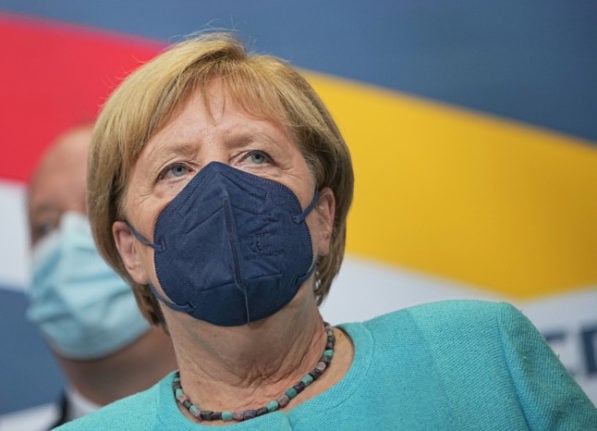
Photo: picture alliance/dpa | Michael Kappeler
8:20pm Elephants' round starts
The German political tradition of the Elefantenrunde (Elephants' round) has started where the candidates are quizzed on what went wrong, what went right and what they think will happen next, all while looking miserable and like they're in need of a stiff drink.
READ MORE: Talking elephants and grumpy politicians - Four things that will happen after the German election
8:05pm - What next for the CDU/CSU?
With the Union facing their worst election results in post-war Germany, political commentators are wondering what’s next for the party.
"What an end to the Merkel era," writes Stefan Braun in the Süddeutsche Zeitung. "Not so long ago, the CDU/CSU seemed immune to such a crash."
Compared to 2017’s federal election results, the barometer for the CDU and CSU is pointing “steeply downwards,” he wrote, while the barometer for the SPD is pointing “steeply upwards”.
"This message alone unleashes a force that is likely to be highly damaging to Laschet, both inside and outside the CDU/CSU. It is more than just a small pointer to who is likely to have the better chances of forming a new coalition at this moment.
"It is probably the Social Democrats."
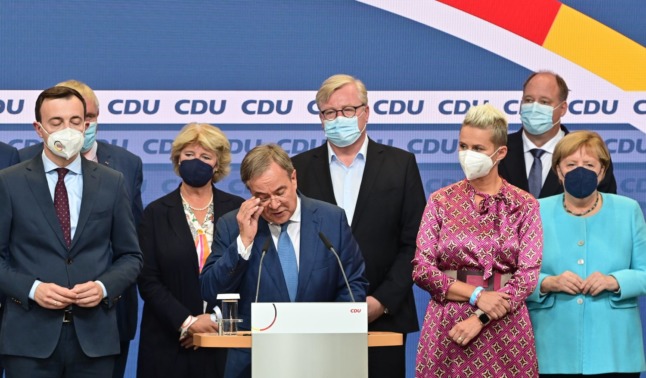 CDU leader and chancellor candidate Armin Laschet speaking to supporters in Berlin. Photo: picture alliance/dpa | Peter Kneffel
CDU leader and chancellor candidate Armin Laschet speaking to supporters in Berlin. Photo: picture alliance/dpa | Peter Kneffel7:50pm: FDP's reaction to the initial results
Christian Lindner, the head of the FDP, has reiterated his preference for a ‘Jamaica’ coalition with the CDU/CSU and Greens (so-called because the party colours match the Jamaican flag), though he says he is open to other options.
"In a democracy you should never rule out talks with other parties,” he said in an interview with ZDF.
"But I’ll say after the election what I said before it: I see the most internal agreement in a Jamaica coalition."
Commenting on the exit polls, which put the FDP on 11.7 percent, he described his party as "strengthened".
"For the first time in our history, we’ve achieved double-digit results in two consecutive elections,” he said. “That’s never happened before. We’re very independent and we’ll take that independence into any coalition talks."
READ ALSO: Which coalitions are possible after the German federal election?
7:39 pm - Latest initial results from public broadcaster ZDF
Centre-left SPD: 25.7 percent
Centre-right CDU/CSU: 24.6 percent
Greens - 14.4 percent
Pro-business Free Democrats (FDP) - 11.7 percent
Alternative for Germany (AfD) - 10.7 percent
The Left - 5.0 percent
READ MORE: Exit polls show German election result too close to call
https://twitter.com/ZDF/status/1442180187718836228?s=20
And from broadcaster ARD - the SPD is also taking a slight lead -
https://twitter.com/mathieuvonrohr/status/1442183111584976897?s=20
7:30pm - The centre-left Social Democrats remain strongest force in Mecklenburg-Western Pomerania
The SPD is in the lead in the northern state parliament vote, according the Infratest dimap forecast. Here are the initial results:
SPD: 37.0 percent (significantly improving on the 2016 result of 30.6 percent)
AfD: 18.5 percent (2016: 20.8 percent)
CDU: 14.0 percent (2016: 19.0 percent)
Left Party: 10.0 percent (2016: 13.2 percent)
The Greens: 7.0 percent (2016: 4.8).
FDP: 6.5 percent (2016: 3.0 percent)
7:15pm - Centre-left Social Democrats' Scholz says voters want him as next chancellor
The SPD's chancellor candidate Olaf Scholz spoke to jubilant SPD supporters in Berlin.
"I am very pleased that the citizens of this country have voted the way they did. This is a real success.
"It's going to be a long election night that's for sure. But another thing that's sure is that many citizens have voted for the SPD because they want a change in the government and they want the chancellor to be Olaf Scholz."
Scholz said the exit polls show that there's a "mandate given to us to make sure all of our proposals are implemented and that we push for this politically".
He added: "We're a pragmatic party, we know how to govern, we're an optimistic party that wants to push for a better future. We have what it takes to govern a country.
"We will deliver on our promises. So let's wait for the final election results. But then we will get down to work."
https://twitter.com/anjk/status/1442175071573843970?s=20
7:00pm - Centre-right CDU wants to lead German government
The CDU's chancellor candidate and leader Armin Laschet spoke out after the initial exit polls, which showed disappointing results for his party. He thanked Chancellor Angela Merkel for her years of service and said he knew this election race would be more difficult without her.
"We can't be happy with this result but this will be a long evening," Laschet said.
However, he said that the CDU and its Bavarian sister party the CSU "will do everything we can to form a German government".
https://twitter.com/mattmoorek/status/1442171022426394625?s=20
"Because what Germany needs now is a future coalition that modernises our country," he added. "Germany needs a coalition for more sustainability in every sense of the word when it comes to climate protection and finances. We bear responsibility for our children and grandchildren.
"We need a coalition that makes our country faster, more digitised, and that frees our country.
"And I will work towards that right now together with Markus Söder of the CSU, and with our whole team. It must be a coalition that brings the country together."
https://twitter.com/philipoltermann/status/1442173930614181889?s=20
7:00pm - Chill atmosphere outside the Bundestag
The Local's Sanja Dordevic took this photo outside the Bundestag in Berlin just as the sun was setting on this historic election day. She said there's a relaxed atmosphere there with a number of other journalists around.
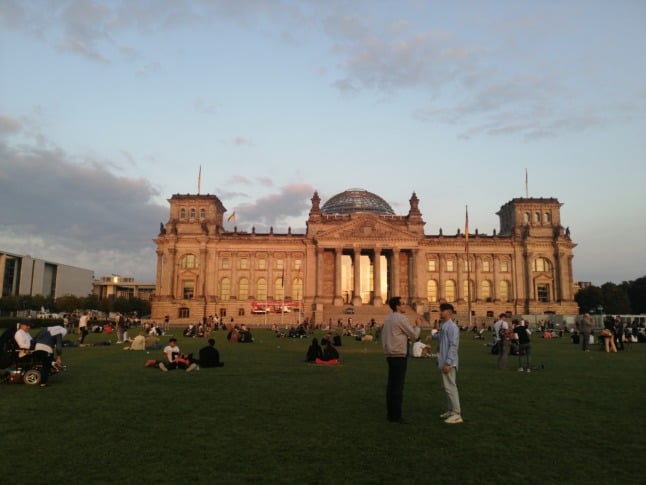 Photo: Sanja Dordevic
Photo: Sanja Dordevic6:56pm - Centre-left SPD takes narrow lead in post-Merkel election, say provisional estimates
Initial result estimates from Germany's general election to pick a successor to outgoing chancellor Angela Merkel on Sunday show the centre-left Social Democrats (SPD) of Finance Minister Olaf Scholz with a narrow lead over their conservative rivals, reports AFP.
Preliminary results published on public television after polling stations closed at 6pm found Scholz's SPD with around 24.9 to 25.8 percent of the vote, followed closely behind by Merkel's Christian Democrats and their candidate Armin Laschet on 24.2 to 24.7 percent.
6:40pm - The SPD says its back in business
Germany's centre-left Social Democrats (SPD) is claiming victory - although it's still too early to tell.
The SPD has has a clear "mandate to govern", the party's general secretary Lars Klingbeil said on Sunday after exit polls showed them on 25-26 percent, closely followed by the conservatives on 24-25 percent, reported AFP.
"We have fought our way back as the SPD, the SPD is back, the SPD clearly has the mandate to govern," Klingbeil told public broadcaster ZDF.
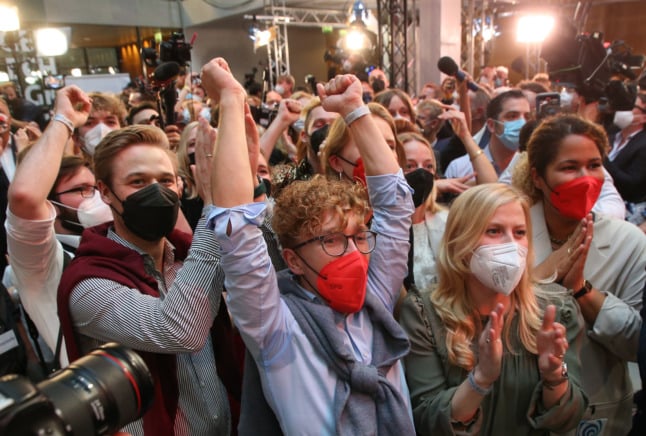 SPD supporters respond to the exit polls at their election party in Willy-Brandt-Haus in Berlin. Photo: picture alliance/dpa | Wolfgang Kumm
SPD supporters respond to the exit polls at their election party in Willy-Brandt-Haus in Berlin. Photo: picture alliance/dpa | Wolfgang KummThe secretary general of Angela Merkel's conservative CDU expressed disappointment with exit polls showing her conservative alliance in second place with around 24-25 percent of the vote after Sunday's general election.
"The losses are bitter compared to the last election" in 2017, when the CDU-CSU scored more than 30 percent, Paul Ziemiak told reporters.
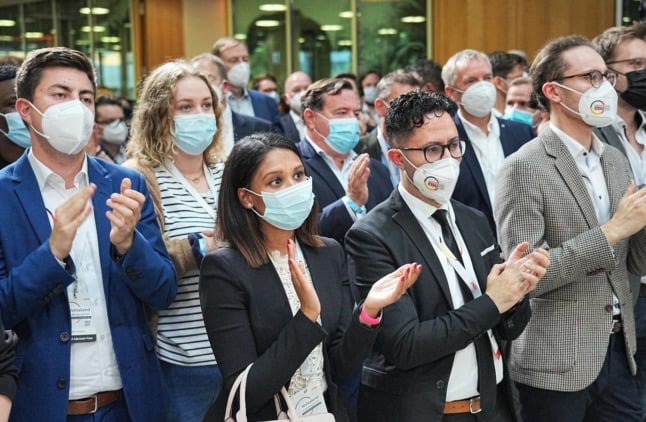 More subdued reaction from CDU supporters at the election party in Konrad-Adenauer-Haus. Photo: picture alliance/dpa | Michael Kappeler
More subdued reaction from CDU supporters at the election party in Konrad-Adenauer-Haus. Photo: picture alliance/dpa | Michael KappelerThe German government is currently a grand coalition made up of the CDU/CSU and the SPD as junior partner.
Here's what the latest exit poll results could mean for seat distribution:
https://twitter.com/dwnews/status/1442167597819072515?s=20
6:36pm - Greens ahead in Berlin parliamentary elections
The exit polls for the Berlin state elections are in, and the Greens have taken a lead. The provisional results are as follows:
Greens: 23.5 percent
SPD: 21.5 percent
CDU: 15 percent
Left Party: 14.5 percent
FDP: 7.5 percent
AfD: 7 percent
6:30pm - Analysis from The Local's political expert Aaron Burnett
"Holy sh*t! Welcome back to the 2005 election results where either big party can declare victory! Without a majority federally, BOTH the SPD and CDU need both the Greens and FDP for a government. Another GroKo (grand coalition - the current government is made up of CDU/CSU and SPD) would be potentially bad for German democracy and neither party will want it. But it’s possible. SPD will probably edge it but coalition negotiations will be long! Angela Merkel will probably be Chancellor still of a caretaker government at Christmas."
READ ALSO: When exactly will Merkel leave office?
6:25pm - Voter turnout may be lower than 2017
Voter turnout may be slightly lower than in 2017, according to a poll. Infratest dimap estimated that the turnout was 76.0 percent, down from 76.2 percent four years ago.
6.23pm - Analysis from political observer Jon Worth
https://twitter.com/jonworth/status/1442161566737125380?s=20
6:15 pm - Do we know who's won the German election?
No. But we will get more concrete results soon and as the night goes on. The postal votes also still need to be counted. Still, it's clearly a very close one.
If there is little to set the two leading parties apart, both the CDU-CSU and the SPD could separately seek to form governing coalitions in a scramble for power - a lengthy process that could blunt Germany on the international stage for some time, reports AFP.
The two men jostling for Merkel's job are Finance Minister and Vice Chancellor Olaf Scholz, 63, of the SPD, and Armin Laschet, 60, of the CDU-CSU.
The secretary general of Germany's SPD Lars Klingbeil said the party 'has clear mandate to govern'.
https://twitter.com/aggichristiane/status/1442160217228120066?s=20
6:10pm - What do the two exit polls say?
Exit polls from Germany's general election to pick a successor to outgoing chancellor Angela Merkel Sunday showed her conservative party in a dead heat with the Social Democrats.
Two surveys published on public television after polling stations closed at 6pm found Merkel's Christian Democrats and their candidate Armin Laschet with around 24-25 percent of the vote, nearly tied with the Social Democrats on 25-26 percent, reports AFP.
Analysts said the trend could shift significantly as results come in due to the large number of postal votes this year because of the coronavirus pandemic.
https://twitter.com/SiobhanDowling/status/1442157900751802370?s=20
6:00pm - SPD and CDU/CSU tie in first exit polls
The first election polls are out - and the Social Democrats and Chancellor Angela Merkel's CDU/CSU are neck-and-neck. According to the first 6pm exit poll, they each received 25 percent. The Greens scooped 15 percent, Alternative for Germany (AfD) and Free Democrats (FDP) managed 11 percent. Die Linke (The Left) managed 5 percent. The picture may still change. It's still all to play for!
https://twitter.com/BR24/status/1442157019717320714?s=20
We'll get further updates on the provisional results throughout the evening.
5:53pm - Meck-Pom voting too
As well as the federal elections, and the city state/local elections plus referendum in Berlin, voters in the north-eastern state of Mecklenburg-Western Pomerania are also voting for a new state parliament today.
According to the regional returning officer, of the 1.32 million eligible voters in MeckPom, 32.5 percent had cast their ballot by 2pm. Five years ago, 32.8 percent had cast their vote by this time.
https://twitter.com/NDRinfo/status/1442146449957998594?s=20
5:36 pm - Waiting on tenterhooks
It's getting down to the wire now, with the first exit polls due at about 6pm. The polls are so close that no one can really predict what will happen. Remember to take the 6pm results with a pinch of salt because the postal votes are not counted.
A look at the voters - a total of 60.4 million people over the age of 18 have been eligible to vote for the next German government. Women voters outnumber men at 31.2 million and 29.2 million, respectively.
You can read about how the complex German electoral system works HERE
5:23pm - Berlin 'to open polling stations longer'
Berlin's state election officials will allow voting after 6pm, according to the "Tagesspiegel. Voting is supposed to end at 6pm across Germany. But in Berlin, long queues are still in place due to some polling stations running out of ballot papers and not being able to get deliveries quick enough. People who join the queue after 6pm, however, will not be allowed to vote, reports German media.
https://twitter.com/tom_nuttall/status/1442134004145147911?s=20
5:12pm - 'Older people don't think about the future'
The Local's Sanja Dordevic has been speaking to voters in Berlin.
Martina thinks the problem in Germany's politics is that everything is about the economy, and not about people. A born Berliner, she thinks nothing will change with the Deutsche Wohnen und Co referendum, even if she supports the initiative.
Johana, 23, hopes for better climate policies. The solution for better politics is to get more young people into decision making - and that's why she thinks Germany should lower the voting age.
"Older people don't think about the far-away future," she said. "Climate change and the gap between rich and poor are problems the new parliament should regulate."
4:59pm - Many coalitions possible
From the polls it looks like Germany is headed for a three-party coalition this time - the first since the 1950s.
So there has been lots of talk about traffic lights, Jamaican flags and other nicknames that describe the hotchpotch of possible coalitions that could be formed after the election. What does it all mean? The explainer below sets out the different combinations we might see.
Which coalitions are possible after the election?
4:45pm - Residents of flood zones vote in makeshift polling stations
In the flood-hit regions of western Germany, voters have been casting their votes in tents this year. In Swisttal, in North Rhine-Westphalia, citizens normally head to the town hall to cast their ballot - but due to the devastation of July's floods, they've had to erect a slightly more makeshift style of polling station.
Speaking to Tagesschau on Sunday afternoon, Swisttal mayor Petra Kalkbrenner described the tents as "airy", adding that they were safer in light of Covid-19. "The atmosphere was absolutely fine, even cheerful," she said.
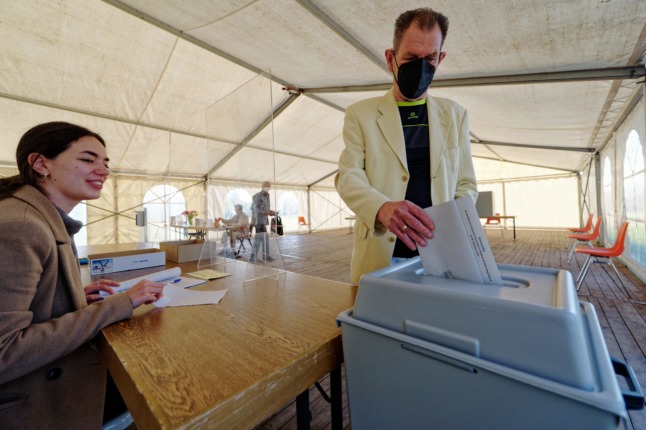 A resident of Swisttal, near Bonn, casts his vote on Sunday. Photo: picture alliance/dpa | Henning Kaiser
A resident of Swisttal, near Bonn, casts his vote on Sunday. Photo: picture alliance/dpa | Henning Kaiser4:35pm - German voters have their say at busy polling stations
In Berlin Neukölln, Lutz, 60, told The Local's Rachel Loxton outside a Wahllokal (voting station) that he voted for the Social Democrats (SPD) at the federal and city state/local levels because he said the party suited him and his life.
Everyone Rachel spoke to said they voted 'yes' in Berlin's referendum asking voters if they want to see housing stock from large landlords expropriated to the state.
Katrin, 44, also voted SPD because they "fit my interests". She said the The Expropriate Deutsche Wohnen & Co campaign was "very convincing".
Benjamin voted for the Greens in all ballots because "we are in a climate emergency". Christina, 54, also voted Greens because of climate change.
And on the topic of housing in Berlin, Christina said: "The housing market is so terrible that we have to do something about it."
There were large queues outside some polling stations in Berlin. The Local is looking into reports that some polling stations have run out of ballot papers, and there are problems with getting deliveries in because of roads closed in the Berlin Marathon. Yes, Berlin also held an actual marathon today - along with its marathon election day.
https://twitter.com/RachLoxton/status/1442093016362196992?s=20
https://twitter.com/AaronGBurnett/status/1442100164055998466?s=20
4:21pm - Early indications of a large voter turnout
By 2pm today - four hours before the polling stations close - 36.5 percent of German voters had already cast their vote in person - which is 4.6 percent less than the turnout in 2017.
However, the provisional turnout doesn't include postal voters. According to information from the Federal Election Officer, at least 40 percent of German voters may have cast a postal vote this year - smashing all previous records. In 2017, 28.6 percent of people voted this way.
Writing on Twitter, the Federal Election Officer urged people who hadn't cast their ballot yet to use their votes.
https://twitter.com/Wahlleiter_Bund/status/1442126159853101062?s=20
4:15pm - 'Something has to change'
The Local’s Rachel Loxton spoke to voters in Berlin Neukölln district. As well as the federal election, Berliners are voting in a city state election, district election and a referendum on housing.
Katie, 34, said she gave the Greens her vote for “basically everything”.
She thought about voting for a smaller party like the Klimaliste but felt her vote might count for more with the Greens.
She said she realises the Greens won’t be the top party nationwide. So she hopes the SPD will win and form a coalition with the Greens and Die Linke (Left party).
She voted ‘yes’ in the referendum asking voters if they want to see housing from large landlords expropriated to the state.
She said: “I know it won’t mean that there is more housing. But it’s a signal that something has to change. We don’t want Berlin to become Dublin.”
This is her dog, Moose who also attended the polling station.
https://twitter.com/RachLoxton/status/1442097741744672771?s=20
4:00pm - How accurate are the 6pm exit polls?
We'll get the first exit poll results just after the polling stations close at 6pm. But they may not reflect the final result - because more people than ever are postal voting.
We unpack the vote counting process in more detail here:
Why Germany's post-election forecast may not reflect the final result
3:45pm - Laschet makes a voting gaffe
There’s already some drama on Germany’s Wahltag. CDU leader Armin Laschet, who’s bidding to fill Chancellor Angela Merkel's shoes when she steps down after this election, committed a blunder by folding his ballot with his choices visible rather than hidden. Unsurprisingly, he cast both his votes for the CDU.
The faux-pas before live cameras sparked a Twitter storm, with some calling it an "own goal" for Laschet, although the chief of the electoral commission Georg Thiel said the ballot was still valid, reported AFP.
https://twitter.com/JeremyCliffe/status/1442089418567815172?s=20
READ MORE: Gaffe-prone Merkel candidate in ballot blunder
Laschet was voting in his hometown of Aachen, western Germany.
Ballots should be folded so that they hide what the voter has chosen, according to the German Federal Returning Officer.
The Federal Returning Officer explained on Twitter that in this case a "well known politician voted, as expected, for his own party." They said they could not see that there was any attempt to influence voters through his mistake.
https://twitter.com/Wahlleiter_Bund/status/1442097968312569858?s=20
3:30pm - What do the latest polls say?
This weekend Angela Merkel urged Germans to give her would-be successor Armin Laschet the vote to shape Germany's future, in a last-ditch push to shore up his beleaguered campaign 24 hours before Germans vote.
Merkel had planned to keep a low profile in the election battle as she prepares to bow out of politics after 16 years in power. But she has found herself dragged into the frantic campaign schedule of the unpopular chairman of her party, Laschet.
Here's what the latest polls say and you can read the full article here.
https://twitter.com/RachLoxton/status/1442042528123932675?s=20
3:20pm - What do Germany's foreign voters make of it all?
With the federal election coming up, lots of new German citizens - including a record number of Brits - are set to join their fellow Germans at the ballot box for the first time.
Aaron Barnett spoke to a few first-time foreign voters in the run up to the election to find out the issues that mattered, including Rachel from the UK.
“I feel like my vote counts for more here than in the UK,” says 33 year-old Rachel Riesner-Marriott, who moved to Germany in 2012, became a citizen in 2018, and married her German husband in 2019. “Where I’m from in the UK is a safe Conservative seat and you can’t really change that. The voting system here (in Germany) means our votes are more likely to count – but I’m glad I don’t have to sort out the actual counting of votes. As I always say, I’m an English teacher, not a maths teacher,” she laughs.
You can read his full article HERE.
3:10pm - What's going to happen next?
Whatever the results are tonight we do have a certain idea of what happens next.
Indeed there are some things that are so certain to happen this Sunday that they are more statements of the obvious than predictions, writes Brian Melican in his pre-election column for The Local.
In this article he picks out four things that will happen – and gives you the vocabulary you need to follow proceedings.
3:00pm - Federal election results live!
Hi all, thanks for joining today's live blog. We'll bring you all the results and the reaction throughout the afternoon and night.
We are expecting the initial election poll results to be announced at around 6pm and then the full results to be become clear later in the night so stick with us and we’ll bring you everything you need to know. One important point though, remember to refresh this page automatically for updates and email us any questions or views you have to news@thelocal.de
You can also follow us on Twitter here @TheLocalGermany and check out @RachLoxton and @imogen_goodman

Comments